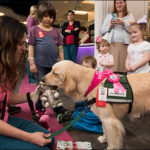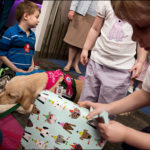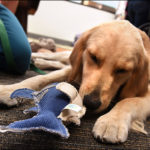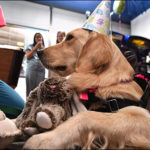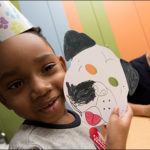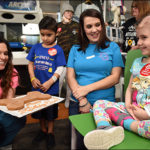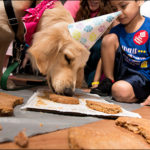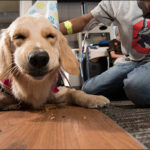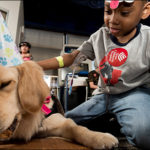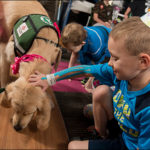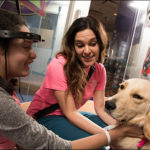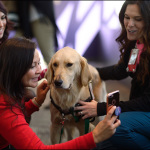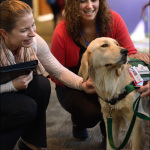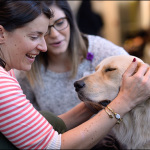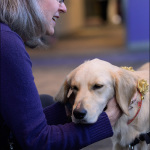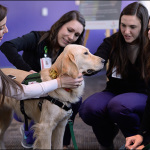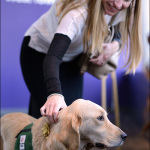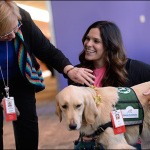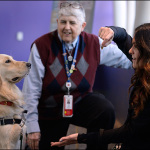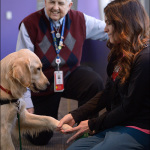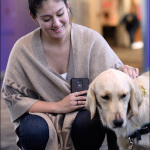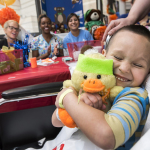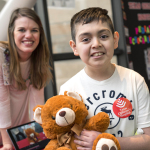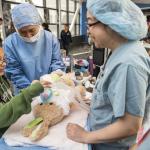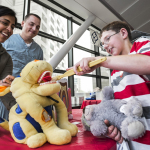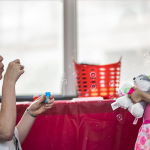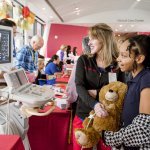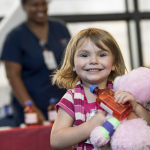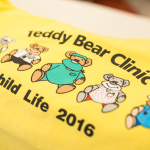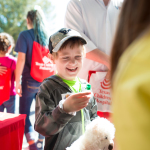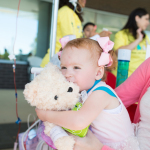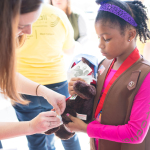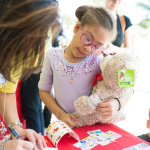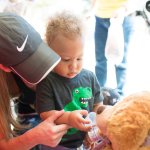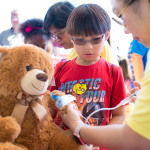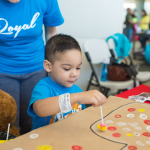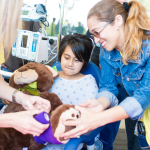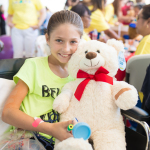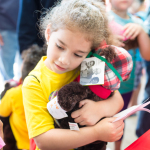September 27, 2016
 Starting on Monday, October 3, you’ll notice a new employee walking the halls of the hospital wearing a bright green vest emblazoned with the Texas Children’s badge. But she is not your typical employee – she is furry, has four legs and is just 1 1/2 years old.
Starting on Monday, October 3, you’ll notice a new employee walking the halls of the hospital wearing a bright green vest emblazoned with the Texas Children’s badge. But she is not your typical employee – she is furry, has four legs and is just 1 1/2 years old.
Her name is Elsa and she is Texas Children’s new therapy dog. Just like any new employee, she will be spending the first few weeks getting acclimated to her new hospital surroundings with her handler before seeing patients in the West Tower.
Elsa is part of Texas Children’s new facility dog program that will officially launch next month. This program uses animal-assisted therapy to enhance the emotional well-being of pediatric patients by reducing their anxiety, perception of pain and fear of hospitalization.
“Our new therapy dog will provide goal-oriented therapeutic interventions to patients, families and staff,” said Mary Tietjens, assistant director of Child Life and Social Work at Texas Children’s. “She will be consulted to provide support to patients and families who may be having trouble coping with hospitalization, a new diagnosis or other traumatic experiences. Our dog also will provide distraction and motivation to patients undergoing certain medical procedures.”
Prior to coming to Texas Children’s, Elsa underwent extensive training with Canine Assistants, a non-profit in Atlanta, GA, that has matched more than 1,500 service dogs including individual and hospital placements. After demonstrating strong competencies geared toward working in a pediatric hospital environment, Elsa spent additional time training at Children’s Hospital of Atlanta working alongside her handler and pediatric patients.
“As Elsa’s handler, we participated in a week long training with Canine Assistants in Atlanta,” said Sarah Herbek, a child life specialist and animal assisted therapy coordinator at Texas Children’s. “I will work alongside the therapy dog and the medical team at Texas Children’s to provide a different focus from illnesses, symptoms, pain and medical treatments. My goal is to prioritize patients who are having a particularly difficult time during their hospitalization.”
The Child Life team has worked with Canine Assistants for the past year gathering benchmarking information and working on program development. Last December, the Development team and Child Life leadership presented the facility dog program to the Shackouls family who graciously decided to support this program.
“It is our hope that the support and love these therapy animals provide will help countless children in making their treatment and recovery journeys brighter,” said Bobby and Judy Shackouls. “We look forward to watching this program grow into something even bigger because every child, no matter their age, gender, background or health condition, deserves to feel the unconditional love and comfort these animals can provide throughout the healing process.”
Elsa will see patients full time starting the week of October 10. To ensure she always looks her best, she will be groomed weekly and her paws will be wiped down daily.
The therapy dog will provide therapeutic intervention to specific patients. A patient who is allergic to dogs will not be consulted and the dog will not go into patient rooms without first receiving verbal permission from a guardian and the medical team.
“We are so excited to finally bring this program to fruition at Texas Children’s Hospital,” Tietjens said. “This was a collaborative team effort and would not have been possible without the support of everyone who was involved.”
If you see Elsa at the hospital, be sure to greet her and make her feel welcome. And, albeit she’ll wag her tail vigorously to show her appreciation and excitement to be part of the Texas Children’s family.


